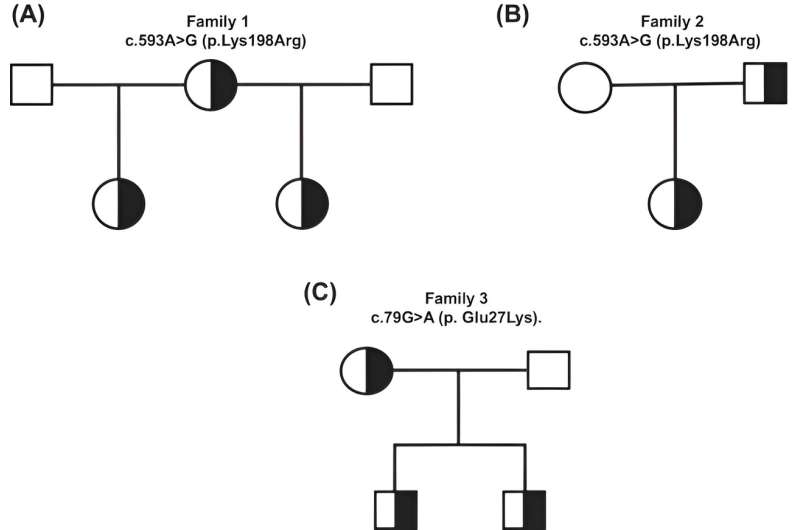This article has been reviewed according to Science X's editorial process and policies. Editors have highlighted the following attributes while ensuring the content's credibility:
fact-checked
trusted source
proofread
Study links inherited mutations to Okur-Chung neurodevelopmental syndrome

Okur-Chung neurodevelopmental syndrome (OCNDS) has long perplexed the medical community with its varied manifestations and genetic origins. A recent study, led by researchers at the Translational Genomics Research Institute (TGen), part of City of Hope, has revealed insights into the hereditary aspects of OCNDS, shedding light on the genetic underpinnings and potential implications for affected families.
OCNDS, a rare autosomal dominant disorder, is characterized by developmental delays, intellectual disabilities, hypotonia, distinctive facial features, and delayed speech. In a study published in Clinical Genetics, researchers provide evidence of inherited CSNK2A1 variants in families with OCNDS, opening new avenues for diagnosis, genetic counseling, and clinical management.
The research team identified three families with OCNDS, where affected parents and children exhibited characteristics consistent with previously reported cases. Utilizing advanced whole exome sequencing (WES) analysis, the study pinpointed specific mutations, or changes, in the CSNK2A1 gene responsible for OCNDS. Notably, Family 1 carried a maternally inherited heterozygous mutation, while Family 2 showcased a paternally inherited mutation and Family 3 exhibited a maternally inherited CSNK2A1 mutation.
"Our findings provide a deeper understanding surrounding the hereditary nature of OCNDS. This study not only expands our knowledge of the syndrome's genetic basis but also underscores the importance of comprehensive genetic testing for accurate diagnosis and personalized management," said Sampath Rangasamy, Ph.D., a Research Associate Professor in TGen's Neurogenomics Division and one of the paper's senior authors.
While developmental delays and intellectual disability were present in all families, the severity of symptoms varied. Behavioral problems, such as autism spectrum disorder, stereotypic movements, aggressiveness, tantrums, and attention deficit disorder, were observed in Families 1 and 3, highlighting the complexity of how each case presents.
By identifying inherited CSNK2A1 mutations and precisely explaining the variability within families, the research contributes to improved disease understanding, enhanced genetic counseling, and more effective clinical strategies. With the growing utilization of next-generation sequencing, researchers anticipate identifying additional families and individuals with OCNDS, ultimately leading to improved care and support for those affected.
More information: Newell Belnap et al, Inherited CSNK2A1 variants in families with Okur‐Chung neurodevelopmental syndrome, Clinical Genetics (2023). DOI: 10.1111/cge.14408



















